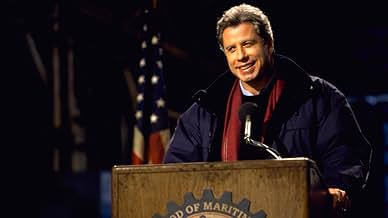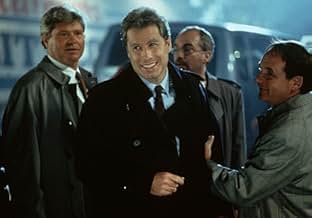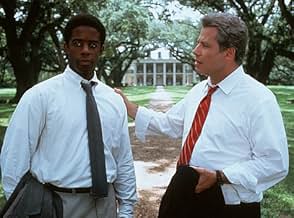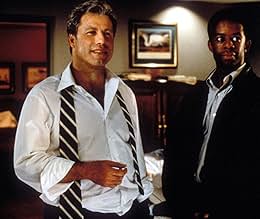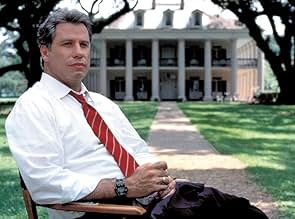Primary Colors
- 1998
- Tous publics
- 2h 23min
Politicien ambitieux, Stanton s'entoure d'une équipe dévouée pour les présidentielles : Henry, un jeune noir sincère et brillant ; Richard un conseiller intraitable ; son épouse Susan, prête... Tout lirePoliticien ambitieux, Stanton s'entoure d'une équipe dévouée pour les présidentielles : Henry, un jeune noir sincère et brillant ; Richard un conseiller intraitable ; son épouse Susan, prête à sacrifier jusqu'à son honneur pour le servir dans sa carrière. [en 255 car. pour champ ... Tout lirePoliticien ambitieux, Stanton s'entoure d'une équipe dévouée pour les présidentielles : Henry, un jeune noir sincère et brillant ; Richard un conseiller intraitable ; son épouse Susan, prête à sacrifier jusqu'à son honneur pour le servir dans sa carrière. [en 255 car. pour champ texte]
- Réalisation
- Scénario
- Casting principal
- Nommé pour 2 Oscars
- 10 victoires et 31 nominations au total
Avis à la une
It's kind of hard to believe the author, since John Travolta's character has a haircut and a Southern accent identical to Clinton's. Also, the scandals Travolta suffers in the film, such as adulterous affairs and having children out of wedlock, also plagued Clinton during his presidency.
Whoever you believe, Primary Colors is a very enjoyable film, even if you don't like political movies. The entire cast is great, especially Larry Hagman as an aging Florida senator who fills in for one of Travolta's opponents after he has a heart attack. It's a good step away from his J.R. Ewing character, even if his accent sounds the same.
Primary Colors is rated R for profanity and sexual references, but I think a PG-13 would have been more appropriate.
Krispy Kreme dougnuts, anyone?
This starts off really great, and gets the flavor of a real campaign, without too much Hollywood hype (campaigns have their own kind of falseness, which is played up here). John Travolta not only hits it just right as a feeling and determined candidate, he also nails Bill Clinton pretty well, too. I don't suppose Emma Thompson is supposed to match Hillary quite as well, but she's a perfect running mate, and throw in Billy Bob (Thornton) as a sidekick and you have a really solid working trio.
But it doesn't quite keep the focus or momentum, or honesty, of the opening scenes. Or humor, sometimes. (This is a comedy, by the way, and director Mike Nichols knows comedy, as does his screenwriter and longtime collaborator, Elaine May. They used to do stand up comedy together in the 1950s!)
What begins as a kind of revelation and interior exploration digresses into more and more clichés of what campaigns do, and what they have to do (sleaze wise) to succeed. We know this stuff. It isn't the facts that enchant us, it's the exceptions to the facts, and it's the nuances between them. It never quite flags, though twenty minutes less screen time sounded good by the end. And Travolta and Thompson hold up their roles consistently.
The real saving grace in the second half is the bursting on the scene of Kathy Bates, who is herself at her best. It might be the best Kathy Bates Kathy Bates has ever done, including some impassioned, tearful stuff. The opposing candidate is remarkably convincing--you even want to vote for him--played by Larry Hagman. On the other hand, the young clerk and campaign manager Adrian Lester is a bit too restrained and dull to make him even noticeable.
Nichols is best when he gets two or three or four people interacting as real people, with flaws and intensity and passion (as in "The Graduate" and "Closer"). And those moments here are terrific, and sometimes hilarious, and make the rest easily worthwhile.
For me, the only big drawback of the picture was the melodramatic suicide of a key player in the drama (I won't say who). I thought it was something this particular character would never do. Otherwise, "Colors" is absorbing and funny and moving nearly all the way. Good moment: The Stantons do a "60 Minutes"-like reaffirmation of their marriage, but as soon as the cameras are turned off, she yanks her hand out of his in a flash.
The film is, in essence, a chronology of Stanton's rise of the political ladder and the struggles encountered by his vibrant team in keeping their man in the race, despite numerous setbacks and tragedies along the way. The script gives Travolta a perfect platform to express the very human emotions that both constrain and encourage us: his early speeches (particularly at an adult literacy centre) are punctuated by salient (yet entirely falsified) anecdotes, and were are given equal insight into Stanton the man and Stanton the politician. Thus the film's fundamental paradox arises: the audience is clearly conditioned to sympathise with Stanton as a result of his remarkable eloquence, yet we are frequently undercut by revelations of sex scandals, endless untruths and the often heartless pragmatism he embarks upon. This conflict for the audience is superbly manipulated so that, at the film's conclusion, we are unsure as to what our own emotions should be. Few films manage to pull this off: fewer with the nuanced skill of Nichols' political odyssey.
I want to add a few words about the female performances in the film. Emma Thompson, as the Hilary Clinton of the the cast, nails both the accent and mannerisms of her model with a convincing determination. Her character is often the mediator among the campaign team, yet there is a ruthlessness about her, a quiet conviction in her actions that her husband is clearly sustained by. Kathy Bates is the unhinged lesbian media consultant who is drafted in to nullify the potent threat of negative media reporting. She clearly gets all the best lines (a prize shared with the equally crazy Billy Bob Thornton character) including a memorable reference to Stanton's string of lovers as "sorry trash bins": scrupulous editing on my part here. At the film's conclusion, Bates comes to the fore, spelling out the impossible conflict between what is politically right and what is humanly right with an intensity that few actors could accomplish. Her subsequent Oscar nomination was well deserved and she was unlucky to be pitted against a triumphant Judi Dench in the Best Supporting Actress category.
That said, this is Travolta's movie. This is a career-defining performance from an actor unfortunately sullied by a series of mind-numbing duds (Battlefield Earth, anyone?), yet had he chosen his roles more wisely (as, say, Pacino has done) a more creditable media image would most certainly have been forthcoming.
Don't be put off by its subject matter: this is film making at its best and is a credit to its highly talented cast and crew.
10/10
Le saviez-vous
- AnecdotesThen-President Bill Clinton enjoyed this movie so much that he even invited John Travolta to a party, on one condition, he must come as Governor Jack Stanton. Travolta declined.
- GaffesWhen watching the New Hampshire returns, one TV station says that Governor Stanton is still out campaigning on the street until the polls close while the other simultaneously says 15 percent of the vote has already been counted. Votes aren't counted until after the polls close.
- Citations
[with a gun in her enemy's crotch]
Libby Holden: I am a gay lesbian woman! I do not mythologize the male sexual organ!
- ConnexionsEdited from Air Bud - Buddy star des paniers (1997)
- Bandes originalesPrimrose Lane
Written by Wayne Shanklin and George 'Red' Callender (as George Callender)
Meilleurs choix
- How long is Primary Colors?Alimenté par Alexa
Détails
- Date de sortie
- Pays d’origine
- Site officiel
- Langues
- Aussi connu sous le nom de
- El escándalo
- Lieux de tournage
- Sociétés de production
- Voir plus de crédits d'entreprise sur IMDbPro
Box-office
- Budget
- 65 000 000 $US (estimé)
- Montant brut aux États-Unis et au Canada
- 39 001 187 $US
- Week-end de sortie aux États-Unis et au Canada
- 12 045 395 $US
- 22 mars 1998
- Montant brut mondial
- 52 090 187 $US
- Durée2 heures 23 minutes
- Couleur
- Mixage
- Rapport de forme
- 2.35 : 1
Contribuer à cette page



